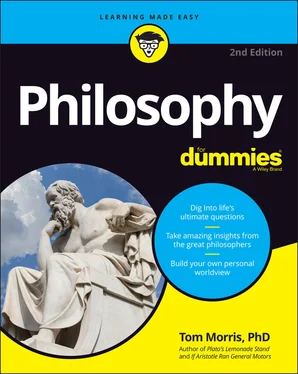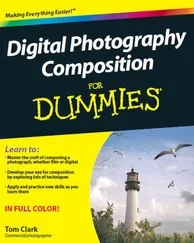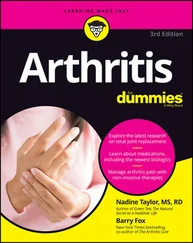Tom Morris - Philosophy For Dummies
Здесь есть возможность читать онлайн «Tom Morris - Philosophy For Dummies» — ознакомительный отрывок электронной книги совершенно бесплатно, а после прочтения отрывка купить полную версию. В некоторых случаях можно слушать аудио, скачать через торрент в формате fb2 и присутствует краткое содержание. Жанр: unrecognised, на английском языке. Описание произведения, (предисловие) а так же отзывы посетителей доступны на портале библиотеки ЛибКат.
- Название:Philosophy For Dummies
- Автор:
- Жанр:
- Год:неизвестен
- ISBN:нет данных
- Рейтинг книги:4 / 5. Голосов: 1
-
Избранное:Добавить в избранное
- Отзывы:
-
Ваша оценка:
- 80
- 1
- 2
- 3
- 4
- 5
Philosophy For Dummies: краткое содержание, описание и аннотация
Предлагаем к чтению аннотацию, описание, краткое содержание или предисловие (зависит от того, что написал сам автор книги «Philosophy For Dummies»). Если вы не нашли необходимую информацию о книге — напишите в комментариях, мы постараемся отыскать её.
Philosophy For Dummies
Philosophy For Dummies
Philosophy For Dummies — читать онлайн ознакомительный отрывок
Ниже представлен текст книги, разбитый по страницам. Система сохранения места последней прочитанной страницы, позволяет с удобством читать онлайн бесплатно книгу «Philosophy For Dummies», без необходимости каждый раз заново искать на чём Вы остановились. Поставьте закладку, и сможете в любой момент перейти на страницу, на которой закончили чтение.
Интервал:
Закладка:
Chapter 3
The Love of Wisdom
IN THIS CHAPTER
 Grasping the three skills that philosophy cultivates
Grasping the three skills that philosophy cultivates
 Analyzing the nature of philosophical analysis
Analyzing the nature of philosophical analysis
 Assessing the importance of assessment
Assessing the importance of assessment
 Appreciating the power of good, logical argument
Appreciating the power of good, logical argument
 Understanding the role of wisdom, the true goal of philosophy
Understanding the role of wisdom, the true goal of philosophy
Things have their seasons, and even certain kinds of eminence go in and out of style. But wisdom has an advantage: She is eternal.
— Balthasar Gracian
As you delve deeply into philosophy, you find there to be many reasons to read, study, and practice it in your life. Philosophy, as a way of thinking, for example, cultivates three particular intellectual skills that are very important for any of us to possess in the modern world. In addition, and most vitally, it can cultivate genuine wisdom.
In this chapter, you get the scoop on the three skills of thought that philosophy cultivates. Then I say a bit more about wisdom — in particular, what it is and why it matters. You’ll see that philosophy is, simply put, primarily a way of thinking about things that matter. It’s also a way of living connected with that path of thought. More precisely, it is a bundle of ways of thinking that involve a set of distinctive mental tools. And that fact is directly relevant to the question of why we study philosophy. After reading this chapter, you’ll view philosophy as more than just something you can use to amaze your friends with profundity, perplex colleagues with a newfound depth, or irritate family members with crazy-sounding questions (although first-year college students seem to value that last possibility the most). You’ll want to study this ancient art of thought because of the mental skills it cultivates in your life, as well as for the deeper and broader new perspectives it can give you.
Identifying Some Skills of Philosophy
Some colleges and universities still require students to take a philosophy course. But confronted with such a seemingly odd demand, the students are often perplexed. They wonder: Why should a pre-med or business major waste any time at all in a philosophy class? Isn’t such a rule much like requiring every student to take a course in Ancient Babylonian Entomology? The concern is that this is just some esoteric relic of the humanities curriculum of the past, no longer at all relevant to modern life.
If you were to hear that many CEOs and other business leaders around the world right now avidly read philosophy, or that even lots of other people at many stages and walks of life do so as well, you might find it puzzling. You may be led to wonder why any busy executive would take valuable time out to devote to philosophy. Or you might pause over what could lead a parent at home engaged in the demanding tasks of raising children to sneak away now and then with a book like this. You could find yourself asking: What’s the relevance of philosophy for life? And what could possibly be the payoff of spending time with philosophy? But don’t worry. The answers to these questions are easy to find.
Mastering analysis
Philosophy as a way of thinking cultivates the ability to analyze complicated problems. It can help you untie mental knots and get to the core of an issue. With an understanding of how philosophy approaches the world, as a big new item in your toolbox, you can get better at breaking problems down into their essential elements, and more manageable components.
Analysis is a skill you need everywhere in life. Lawyers analyze complex claims and sort out the issues; physicians analyze symptoms; detectives look for patterns in the evidence; business people sort through the various parts of an intricate deal; parents try to untangle and get a grip on the issues troubling a family. The skill of analysis is useful in every walk of life. In fact, analysis is so prominent in philosophical ways of thinking that a major trend of 20th-century thought is known as analytic philosophy because of its emphasis on the centrality of this skill. But all good philosophy involves close analysis. Philosophers analyze major problems so that they can sketch out possible solutions, and then analyze those potential solutions for their fitness and truth.
Ultimately, philosophy teaches us how to analyze our lives, with questions like: Who am I? What do I really want and need? What is this life all about? What can make me happy? How can I make my greatest contribution to the world? And: Why didn’t I discover the joy of philosophy much earlier in my life?
In following a philosophical analysis of a major human question and learning from some of the greatest thinkers in history how to tackle a complicated issue, you can become a better analyst of problems and much more analytical in other aspects of your life. Now, this endorsement of analysis is not meant as a suggestion that it’s the most important mental skill, or as a claim that a practice of philosophical analysis is somehow paramount in human life. It’s not. It is, however, important. You can be psychologically paralyzed in many ways if you are unable to analyze your circumstances and opportunities properly. The skill of analysis clarifies your world and liberates you from the vagueness that holds too many people back. As the scientist and philosopher Blaise Pascal reminded us long ago, “Man is but a reed, the weakest thing in nature, but he is a thinking reed . ” And thinking well is strength.
 Analysis is a vital mental skill. It must, however, be used appropriately. There is a well-known phenomenon, commonly called analysis paralysis , which results when too much thinking actually gets in the way of decisive action — or even in the way of proper emotions. A person can analyze an opportunity or a relationship to death. The unexamined life may not be worth living, as Chapter 1explains, but the unlived life is definitely not worth examining. Thinking should never replace taking action; it should merely guide what we do. All good things can be misused. And certainly, logical and analytic thinking can be misused. It’s up to each of us to use it well.
Analysis is a vital mental skill. It must, however, be used appropriately. There is a well-known phenomenon, commonly called analysis paralysis , which results when too much thinking actually gets in the way of decisive action — or even in the way of proper emotions. A person can analyze an opportunity or a relationship to death. The unexamined life may not be worth living, as Chapter 1explains, but the unlived life is definitely not worth examining. Thinking should never replace taking action; it should merely guide what we do. All good things can be misused. And certainly, logical and analytic thinking can be misused. It’s up to each of us to use it well.
My point here is that the better you become at analyzing complex problems, the better off you are at solving them. Analysis is a skill that philosophy cultivates. And it’s a skill for all of life. The real truth about thinking and action is that, if you don’t possess analysis as a life skill, you’re much more likely to experience fruitless confusion in the face of difficulty. Analytical acumen, at its best, liberates. And you’ll find that every chapter in this book will train you in careful analysis, by showing how experienced thinkers tackle some of the thorniest problems you will face as you seek to understand life better.
Improving assessment
Philosophy also trains us to assess competing claims. Do people have free will, or are all our actions determined by heredity and environment? Does God exist, or not? Do humans survive physical death, or is everyone destined for personal extinction with the cessation of bodily functions? Does life truly have meaning, or is everything we do ultimately without any real sense and purpose? Is skateboarding great exercise, or maybe the fastest route to the emergency room? (Okay, so not all questions are cosmic in proportion.)
Читать дальшеИнтервал:
Закладка:
Похожие книги на «Philosophy For Dummies»
Представляем Вашему вниманию похожие книги на «Philosophy For Dummies» списком для выбора. Мы отобрали схожую по названию и смыслу литературу в надежде предоставить читателям больше вариантов отыскать новые, интересные, ещё непрочитанные произведения.
Обсуждение, отзывы о книге «Philosophy For Dummies» и просто собственные мнения читателей. Оставьте ваши комментарии, напишите, что Вы думаете о произведении, его смысле или главных героях. Укажите что конкретно понравилось, а что нет, и почему Вы так считаете.












